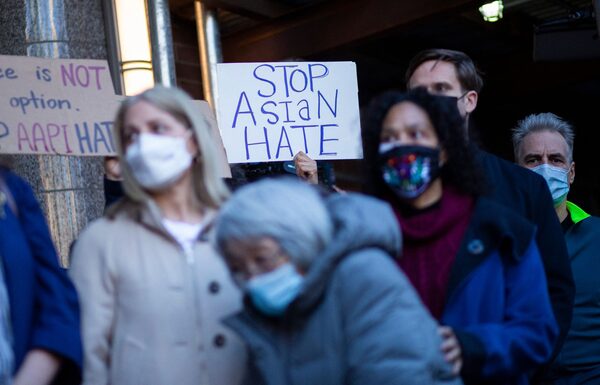
People attend an Asian American anti-violence press conference outside the building where a 65-year-old Asian woman was attacked in New York on March 30, 2021.KENA BETANCUR/AFP/Getty Images
Melanie Challenger is the author of How to Be Animal: A New History of What It Means to Be Human.
Everybody is fixated on a post-COVID world. Many hope that when this pandemic is history, we will emerge into a healthier, happier place.
Consider how often we’ve heard the line “Build back better.” It’s even got its own hashtag. Recovery from the stresses and privations of the worst global health crisis in living memory has become synonymous with positive change.
In October, the Canadian government announced an ambitious plan, the Anti-Racism Action Program, in recognition of this. Post-pandemic Canada, we’re told, will be a “better” and “more consciously inclusive” society, more capable of healing the divisions that have rocked the world in the past few years. Systemic racism and discrimination will be addressed.
Similar promises have been made in other countries. U.S. President Joe Biden has committed to healing a divided and “distrustful” nation. In my home country, Prime Minister Boris Johnson has announced a series of radical reforms to “build back better, build back greener, build back faster.” Each is a response to the fact that our societies are grievously divided and riven with inequities.
In 2019, an Abacus poll found that almost half of all Canadians were “fearful and frustrated” about the future and that one in four believed Canada would be better off “if it was more white.” A quarter of respondents also believed Canada would benefit if there were no Muslims in the country. But these are averages. The poll also identified 25 per cent of Canadians as “polarized voters,” defined as unwilling to even consider compromise and believing that those with different political views are “enemies.” This kind of polarization is equally common among both left-wing and right-wing voters.
We have similar problems in the U.K.. Despite several years of soul-searching in the wake of the Brexit vote, politics remains fractured, and social media platforms have proven powerful amplifiers of deep ideological divisions. Cynicism, mistrust and hostile public debates on the issues that affect all our lives are steadily eroding our faith in democracy. And we face far more serious challenges in the coming decades.
So, will this really be the moment of promised change? Historically, crises such as wars or pandemics have disrupted norms while increasing polarization both on regional and global scales. Consider the Cold War that emerged from two ideologically opposed superpowers in the aftermath of the Second World War. In some ways, the threat of a nuclear war was good for alleviating internal strife. A common enemy can break the deadlock between voters and political parties and promote bipartisanship, as it appeared to do during the 1960s in the U.S. But once the threat passes, tensions within the populace can erupt again. We live that reality today.
There’s been a flood of commentary on the causes of democracy’s woes, but everyone points to social and historical forces. Yet the way we behave in response to fear, often entirely unknowingly, is just as powerful an agent of division. A crucial piece of data from the Abacus poll shows us that while fewer than half of Canadians feel “fearful” about the future, the numbers rocket up to 63 per cent among polarized voters. And there’s a simple reason for this: Fear can have profound effects on our bodies and can shape our point of view. So why have we consistently ignored or even denied the ways our physical lives affect our politics?
Stress isn’t just something we imagine. It happens in our bodies. When we face difficult times, hormones such as cortisol pulse through us and can have long-term consequences for our health. Unsurprisingly, we have all kinds of ways of dealing with threats and the anxiety that follows. One solution is to find security among family and friends. It’s for this reason that it feels so good to hold a loved one close during hard times. Just giving each other a hug results in our bodies releasing substances such as glucocorticoids that help soften the damaging effects of stress.
But humans, remarkably, buffer themselves through ideas as much as intimacy. We can find ourselves vigorously reinforcing our beliefs and ideologies when facing a threat. And sometimes that tips over into aggression toward people outside our group or whose ideas appear to contradict our own. A challenge to our beliefs can almost feel like a threat to our immune system. With this in mind, we can make better sense of the correlation between fear and polarization. But we can also see the challenges we might face as we try to build back better.
Crises are opportunities for reflection and change. But they can also be moments of entrenchment and reaction. We must prepare ourselves for the possibility that this pandemic may make us less open to debate and more vociferous in our beliefs. Stressful events can have lasting effects on our bodies and how we rationalize the world. Troubling news cycles and life experiences make our hearts race. They flood our bodies with stress hormones that change the speed with which we type on a keyboard and affect our willingness to listen to another point of view. The pandemic is likely to stir up this toxic mix of biology and ideology.
If we want to find some balance in the years ahead, we need to take the edge off fear. Paying attention to our mental and physical well-being will be crucial if we wish to remedy some of the bitterness and bigotry that has afflicted our societies. If we can’t help but seek reassurance in our beliefs, we must work hard to find an idea around which we can all rally.
Keep your Opinions sharp and informed. Get the Opinion newsletter. Sign up today.